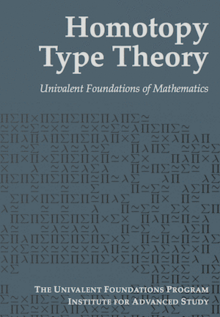
In mathematical logic and computer science, homotopy type theory (HoTT) refers to various lines of development of intuitionistic type theory, based on the interpretation of types as objects to which the intuition of (abstract) homotopy theory applies.
This includes, among other lines of work, the construction of homotopical and higher-categorical models for such type theories; the use of type theory as a logic (or internal language) for abstract homotopy theory and higher category theory; the development of mathematics within a type-theoretic foundation (including both previously existing mathematics and new mathematics that homotopical types make possible); and the formalization of each of these in computer proof assistants.
There is a large overlap between the work referred to as homotopy type theory, and that called the univalent foundations project. Although neither is precisely delineated, and the terms are sometimes used interchangeably, the choice of usage also sometimes corresponds to differences in viewpoint and emphasis.[1] As such, this article may not represent the views of all researchers in the fields equally. This kind of variability is unavoidable when a field is in rapid flux.
- ^ Shulman, Michael (27 January 2016). "Homotopy Type Theory: A synthetic approach to higher equalities". arXiv:1601.05035v3 [math.LO]., footnote 1